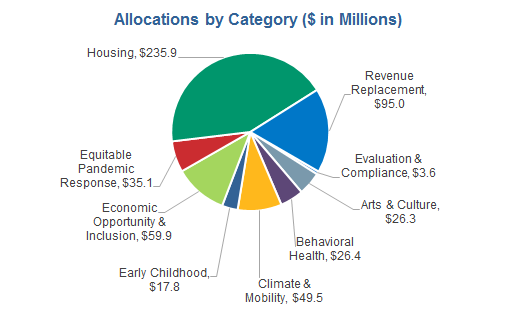March 14, 2024

Boston is at a crucial turning point as Covid-era federal relief funds used to address a broad range of ongoing challenge, will be depleted over the next three years.
With $559 million in American Rescue Plan Act (Covid relief) funding, Boston used just 17 percent of the funds to supplement operating revenues, dedicating the rest to challenges in housing, economic opportunity and inclusion, and climate.
As those funds run out, crucial decisions loom regarding which programs should continue and how the city will pay for them. The assessment of programs and the decision-making process regarding their continuity should be an ongoing initiative, commencing now to ensure that the city makes timely, informed, and effective decisions.
The allocation of funds to various city departments, businesses, and non-profits underscores the multifaceted approach taken by the city and highlights the potential budget hole that will be left once the monies are spent. Some programs address one-time needs such as specific physical infrastructure updates or expanded public health services required by the pandemic. However, many programs provide services to Boston residents such as commercial rent and mortgage relief, food insecurity alleviation, and workforce training.
These services are often ongoing rather than one-time in nature, which means the end of Covid relief funding will create a funding gap. This underscores the importance of the city's proactive preparation to sustain programs where deemed suitable and financially prudent. As shown on the accompanying chart, to date, Boston has allocated relief funds targeting areas such as housing ($235.9M), economic opportunity and inclusion ($59.9M), and climate and mobility ($49.5M).
The next steps for Boston hinge on thorough evaluation, prudent decision-making, and sustainable funding mechanisms. With $3.6 million of Covid relief funds set aside for overall evaluation and compliance, the city has demonstrated a commitment to scrutinizing the impact of funded projects.
As the evaluation process unfolds, the tough work comes in determining which programs to continue and how to pay for them. Given the uncertainty in Boston’s post-Covid economy, the financial implications of program continuation necessitate a transparent approach. Boston must communicate the sources of funding and multi-year sustainability of any program that it seeks to continue.
One Covid-relief-funded program, Boston’s fare-free bus pilot, to which the city allocated $10 million, was recently extended for two more years. A mid-program evaluation revealed increased ridership on free bus routes, indicating the value of this service and its merit for continuation. The cost of the program, $350,000 per month, is covered by relief funds, which raises the question of how the initiative will be paid for long term.
As Boston steps beyond the end of Covid federal relief funding, it is crucial for the city to develop a strategic and well-communicated plan for sustaining essential services. The Wu administration should be up front and transparent about program evaluation, decision-making, and funding sources when continuing any of these programs.
The Boston Municipal Research Bureau is an independent, member-supported, non-partisan research organization, established in 1932 to provide objective and impartial research and policy analysis in order to promote more efficient, effective and responsible government for the City of Boston.



